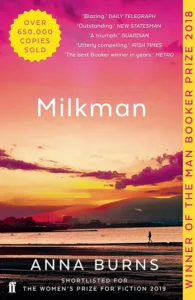My thoughts on a Booker Prize winning novel about a teenage girl living in 1970s Belfast and struggling to survive in a claustrophobic community of rumour and suspicion.
I was surprised to find Milkman by Anna Burns on the shared bookshelf of a small seaside hotel in Crete, nestled in among the thrillers and romances. This is certainly not your typical beach read: it’s a literary novel about life in the violent, dangerous world of 1970s Belfast, and it features a very unusual, distinctive narrative voice. Here are the opening lines, to give you an idea:
“The day Somebody McSomebody put a gun to my breast and called me a cat and threatened to shoot me was the same day the milkman died. He had been shot by one of the state hit squads and I did not care about the shooting of this man. Others did care though, and some were those who, in the parlance, ‘knew me to see but not to speak to’ and I was being talked about because there was a rumour started by them, or more likely by first brother-in-law, that I had been having an affair with this milkman and that I was eighteen and he was forty-one.”
The whole novel is told in this way, with events unfolding not in chronological order but in a long stream of associations, as part of the thoughts and reflections of the 18-year-old narrator. She spends a lot of time walking around the city with her head in a book, and as she does so, her mind wanders and we wander with her, gradually understanding how the community works and how all the disparate events of her young life come together to create the scene of the opening lines, with the death of the milkman and the gun threat.
Another interesting aspect that you probably noticed from those opening lines is that there are no names used in the book. Characters are referred to as “first brother-in-law”, “maybe-boyfriend”, etc. When other characters refer to the narrator, they call her “middle sister”, “maybe-girlfriend”, etc., depending on their relationship to her. Although the book is clearly set in 1970s Belfast, the city is never named, and Burns also avoids naming things like the IRA, the British state, the loyalist paramilitaries, etc.
I think this serves a couple of different purposes. One is to help readers step out of their normal assumptions and take a fresh view. The city described in Milkman is deeply divided, with fierce loyalty expected from communities on each side and enforced by armed groups. The residents of these communities have a complex relationship with these armed groups: they fear them and their sometimes arbitrary, violent judgments, but they also view them as protectors and support their cause.
By avoiding names and their associations, Burns manages to avoid the gasps of shock and the “How can you condone terrorism?” questions. She shows how different things look to people who sit in a different place in the world, and that’s a very valuable exercise, with powerful resonances far beyond Northern Ireland. It’s something Aminatta Forna also did very successfully in the context of the breakup of Yugoslavia in The Hired Man.
The other reason for the anonymity is that it reinforces the claustrophobic atmosphere of fear and suspicion that pervades the book. This is a small, tight community run by rumours and hearsay, which is maybe like many small communities except that in this case the rumours can easily get people killed. Maybe-boyfriend, for example, is at first excited to get his hands on a supercharger from a classic Bentley Blower, but then a rumour spreads that because the car comes from “over the water”, the part has that country’s hated flag on it, and people suspect him of being an informant. In this kind of atmosphere, people become closed, careful of every word, and calling people and places by anonymous pseudonyms fits in perfectly.
Milkman won the Booker Prize in 2018, and I can see why. It brings in complex themes about living in a war zone and the ensuing conflicts over trust and secrecy, community and loyalty, etc. The story has just enough to pull you through—the mystery over the milkman, why he was shot, why the narrator was threatened with a gun and called a cat, etc. And the characters are oddly compelling. But most of all, the voice is so unique and distinctive that, although it’s not always easy and requires some attention to follow the associations and keep track of the meandering narrative, the rewards are worthwhile.





There are 8 comments
Great review, thanks!
Glad you liked it, Emma 🙂
This looks really powerful, and I have not heard of it. Thank you!
It is indeed, Bean. I found it a great way to deal with a complex political issue in a clever way, using the literary form to mirror some of the social issues in Belfast at that time. I can strongly recommend it.
You have me intrigued! Sounds like a great read.
Ah, that’s my job done then 🙂
I wonder if the reader who left it there had anticipated a different sort of read, maybe from the pinkish tones of some of the paperback editions’ covers? hee hee Well, just as well, since you obviously appreciated/enjoyed it a great deal. I’ve never read a book that I found on a holiday, but I love the idea of it, just happening into a story and letting it happen to you, while you’re away from home.
Haha, you might be right! It does look like a good beach read from the cover, and the blurb comments like “Outstanding” and “Compelling” don’t really enlighten a prospective reader very much. I love the serendipity of those shared hotel bookshelves—they don’t often offer much for me, but it’s great when they do. I’ve always loved the idea of BookCrossing and meant to try it, but never have. I should do it on my next trip though.